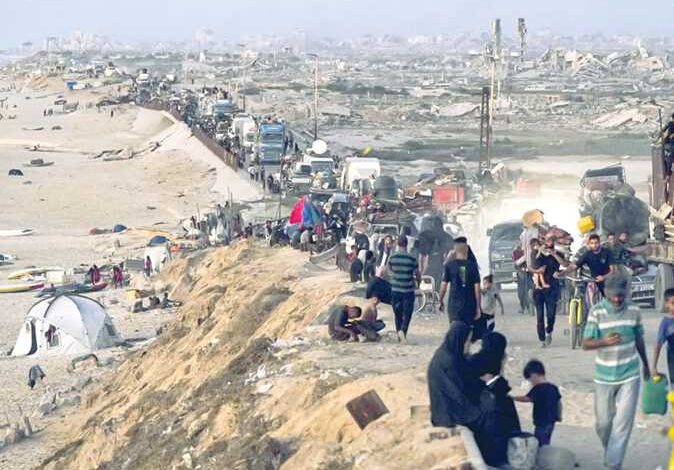
Egyptian Minister of Foreign Affairs, Emigration and Egyptian Expatriates Badr Abdelatty accentuated that Egypt’s vision regarding the Gaza issue is clear and focuses on the necessity of an immediate ceasefire, ending the daily killings and genocide occurring in the Gaza Strip under the nose of the world, in addition to stopping Israeli policies that constitute flagrant violations of international law in the West Bank.
He made the remarks in an exclusive interview on Wednesday, Octobor 1, 2025, with Al Arabiya Al Hadath channel on the sidelines of the Munich Security Conference in Saudi Arabia’s Al-Ula city.
He said “a ceasefire must be realized immediately after the transitional arrangements in the Gaza Strip are completed, where the Palestinian Administrative Committee manages the Strip temporarily, paving the way for enabling the Palestinian Authority to assume its role.”
He added that Gaza is run only by Palestinians, which is obvious, and Egypt’s role is to offer support and assistance, while the role of the international committee mentioned in US President Donald Trump’s plan is to support the Palestinian committee, then the Palestinian Authority, so it can fully manage Gaza and unify it with the West Bank as a precursor to establishing the Palestinian state.
Abdelatty noted that President Trump’s plan includes several positive elements, notably the immediate end to the war, full rejection of annexation of the West Bank, unification of it with Gaza, and complete rejection of Palestinian displacement.
He stressed the need to build on these positive elements, noting that some issues require broad and deep discussion to reach consensus, especially regarding on-the-ground implementation.
Abdelatty confirmed that Egypt will not allow the displacement of Palestinians and that neither the Arab peoples nor the free world will accept this complete crime, as it would constitute ethnic cleansing.
There is no moral, ethical, or legal justification for Palestinians to leave their land; they have a historic right to it and must remain, and Egypt will not allow this to happen.
He explained that the Rafah border crossing on the Egyptian side will be only for the entry of aid into Gaza and will not serve as a gateway for injustice or displacement.
Abdelatty stated that the Egyptian side has repeatedly declared that Rafah Crossing on the Egyptian side is open 24/7, with over seven thousand aid trucks waiting on the Egyptian side.
He pointed out that the real problem lies with the Israeli side, which keeps the crossing closed from the Palestinian side.
Abdelatty noted that there are five other crossings linking Israel to the Gaza Strip, and Israel, as the occupying power, holds the legal responsibility to open these crossings for the entry of essential and humanitarian aid into the Strip.
Regarding the fate of Hamas, the foreign minister affirmed that this matter will be decided by the Palestinian people themselves.
However, Egypt will seek to establish a Palestinian administrative authority to rule the Strip for a limited transitional period with support from the international mission to be deployed in Gaza under President Trump’s initiative, until the Palestinian Authority is empowered to take the helm.
He clarified that the members of this administration will be technocrats, not faction members, and therefore Hamas will have no role in managing the Strip after the ceasefire. Minister of Foreign Affairs, Emigration and Expatriates Badr Abdelatty said Egypt is the most affected country globally by the ongoing escalation jeopardizing freedom of navigation in the Red Sea, a vital artery of international trade.
He further noted that government agencies and the state budget have already sustained losses of 9 billion dollars since the crisis in the Red Sea and the Gulf of Aden began.
Abdelatty stressed that Egypt is one of the regional actors most directly concerned with efforts to de-escalate tensions related to the situation in Gaza, noting that ending the war in the Strip would help reduce tensions in the region.
On the Red Sea governance, the minister stated: “Let me be clear: governance of the Red Sea is solely the responsibility of its littoral states. Non-coastal countries have no role in this regard, particularly landlocked African states, and specifically Ethiopia. It is unacceptable for them to participate in Red Sea governance, which is an exclusive matter for the littoral states.”
He added that consultations are underway with Saudi Arabia, as a sisterly and principal Red Sea littoral state, on future arrangements, noting that Egypt and Saudi Arabia primarily bear the responsibility for Red Sea governance alongside other coastal nations.
Turning to the issue of the Grand Ethiopian Renaissance Dam (GERD), Abdelatty said: “There are no negotiations at present. The talks have reached a complete deadlock. We have made it unequivocally clear that this path has reached its end, and Egypt fully reserves its right under international law to defend its existential interests and water rights by all means if they are threatened or harmed.”
The minister cautioned that Egypt has so far been shielded by above-average rainfall in recent years, but warned that a prolonged drought, which historically strikes the Nile Basin once every 50 to 70 years, would pose a grave threat.
Such a scenario, he warned, would be catastrophic for both Egypt and Sudan if no legally binding agreement is reached on the dam’s operation.
Commenting on Ethiopia’s unilateral actions, Abdelatty underscored the urgent need for a legally binding agreement on the operation of the GERD, warning that the absence of coordination with downstream countries could have grave repercussions.
He noted that Ethiopia’s unilateral measures have already triggered severe flooding in Sudan, stressing that such actions represent a blatant violation of international law.
He underscored that no upstream or southern Nile Basin country has the right to implement projects or undertake practices affecting downstream states without prior consultation, stressing that Ethiopia has continued its unilateral measures in flagrant violation of international law.
Abdelatty reaffirmed that Egypt possesses both the political will and the full legal right to take action should any harm be inflicted on its or Sudan’s vital interests as downstream states.
In response to a question about potential measures if all legal avenues are exhausted, Abdelatty stressed that Egypt retains the full right to self-defense under international law.
On Sudan, Abdelatty expressed Egypt’s deep sorrow over the ongoing violence and destruction afflicting the brotherly Sudanese people.
He reaffirmed Egypt’s firm position in support of the Sudanese state and its national institutions, particularly the armed forces.
He stressed that Egypt will spare no effort to help end the devastating war in Sudan, highlighting Cairo’s intensive efforts to resolve the crisis by working toward the implementation of the outcomes of the September 19 Quartet Statement on Sudan.




